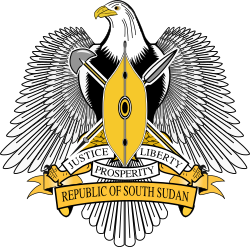
The following outline is provided as an overview of and topical guide to South Sudan:
Contents
- General reference
- Geography of South Sudan
- Location
- Environment of South Sudan
- Regions of South Sudan
- Demography of South Sudan
- Government and politics of South Sudan
- Branches of the government of South Sudan
- Foreign relations of South Sudan
- Law and order in South Sudan
- Military of South Sudan
- Local government in South Sudan
- History of South Sudan
- History of South Sudan, by period
- History of South Sudan, by region
- History of South Sudan, by subject
- Culture of South Sudan
- Art in South Sudan
- Sports in South Sudan
- Economy and infrastructure of South Sudan
- Education in South Sudan
- People from South Sudan
- See also
- References
- External links
South Sudan is a landlocked country in east-central Africa that is part of the United Nations subregion of Eastern Africa. [1] It was previously known as Southern Sudan. It is located south of Sudan, and includes the vast swamp region of the Sudd, formed by the White Nile and known locally as the Bahr al Jabal. South Sudan became an independent state on 9 July 2011, following a referendum that passed with 98.83% of the vote. [2] [3] It is a United Nations member state, [4] [5] a member state of the African Union, [6] and a member state of the Intergovernmental Authority on Development. [7] In July 2012, South Sudan signed the Geneva Conventions. [8] Its current capital is Juba, which is also its largest city. The capital city is planned to be changed to the more centrally located Ramciel in the future. [9]

